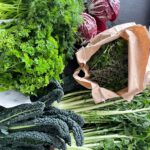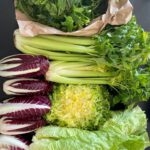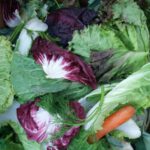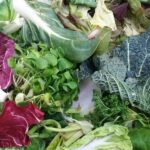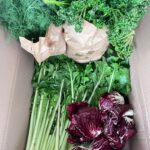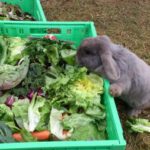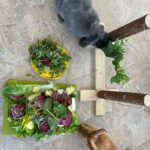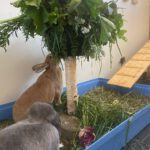Especially in autumn, local fruit varieties can be a valuable addition to the feeding plan. In principle, all native fruits are suitable for rabbit nutrition. Fruit is an energy source that is particularly appreciated by large breeds. However, fruits should only be given as a small hand-fed supplement and never as a real part of the daily diet, because they contain very little plant fiber. Fruit also works very well as a treat. Too much fruit can lead to diarrhea (yeast overgrowth in the feces and intestinal imbalance), insufficient dental wear (because it fills them up too quickly), and excess energy intake (overweight, etc.).
Carrots: approx. 5% sugar
Dandelion: approx. 8.5% sugar
Hay: approx. 10–20% sugar
Apples: approx. 10% sugar
Grapes: approx. 15% sugar
Banana: approx. 18% sugar
Pear: approx. 10% sugar
Plum: approx. 8% sugar
On the right side of the photo, you can see a rabbit spitting out the plum pit. Stone fruits contain pits that can have toxic components, but they are completely harmless when fed to rabbits because the pits are too hard and are spat out.
Fruit is not a staple food but only a supplement to fresh greens. In autumn, seasonal fruit can be fed in slightly larger amounts (e.g., windfall fruit), as long as the rabbits tolerate it and are not overweight. Normally, fruit should only be given as a treat by hand. Rabbits with digestive issues or yeast overgrowth should not receive any fruit at all — not even as a treat.




